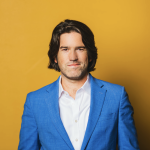Author: Noah St. John
The Character Ethic vs. The Personality Ethic – Why Character Trumps Personality As Stephen Covey writes in The 7 Habits of Highly Effective People, most of the success literature published in the United States for the first century and a half after 1776 focused on The Character Ethic as being the underlying foundation of how a person can live an influential, […]
The Character Ethic vs. The Personality Ethic – Why Character Trumps Personality
As Stephen Covey writes in The 7 Habits of Highly Effective People, most of the success literature published in the United States for the first century and a half after 1776 focused on The Character Ethic as being the underlying foundation of how a person can live an influential, successful and happy life.
The Character Ethic includes primary and universal principles of human success, leadership, and effectiveness including:
In these works, it was understood that a person should develop fundamental behaviors like listening, However, shortly after World War I, Covey explains, the basic view of success shifted from the Character Ethic to The Personality Ethic.
In these works, the approach behind success shifted to focusing on personality techniques – as opposed to character building.
In short, the focus shifted from building the primary human character traits listed above to simply improving secondary behavior skills — for example:
While some of this newer literature briefly discussed the importance of character, it became mostly lip service – as long as you say and do the right things and package yourself in the right ways, you will be likely to get the results you want.
Since I was born in the late 1960’s, I had virtually no experience with the success literature from the earlier, The Character Ethic Era.
Instead, I was raised on a steady diet of Personality.
All of the success books I read or listened to said that you should smile, dress nice, say and do the right things – and if you look good and appear interested in other people, you can pretty much get what you want in life.
I had unwittingly been taught to try and control, manipulate, and maneuver my way through life – without ever taking into account Who I Really Am or what I actually wanted to do with The Character Ethic.
It occurred to me that this was the height of irony – because, as all these books and programs had been telling us on one hand that this is the way to “get what you want in life”…
The hidden – or no-so-hidden – message in all of these programs is also — Fake it until you make it.
Wow. That was a stunning realization for me.
Because I was shocked to realize that while I had been mostly faking my way through life – because I had no idea who I was or what I really wanted…
I also realized how many people I had been manipulated by, who had done the exact same thing to ME – because we’d all been reading the same books!
All I had ever tried to do was change my personality…
Because that’s what all those books told me to do.
The fact is, in all these books, I never heard anyone talk about what The Character Ethic is or how important it is – or even mention that you should have it.
Today, however, as I teach my clients in my online courses like Power Habits® Academy as well as my coaching programs, every day I see more and more how important it is to get back to The Character Ethic.
So how do we do that?
As Stephen Covey (my first unofficial mentor) often said (I’m paraphrasing): “The fastest way to build character is to make a promise and keep it.”
In The 7 Habits of Highly Effective People, Covey also wrote about the P/PC Balance, which means Production vs. Production Capacity — and represents this through the fable of The Goose and The Golden Egg.
When I discovered Covey and his book, that’s when I learned the term paradigm, meaning “the perspective with which you see the world.” Your paradigm is your map of the universe.
Now we hear the term paradigm shift everywhere from the world of business to philosophy to human communication of every kind.
Even before he got to Habit 1 – Be Proactive, Covey wrote about why each habit is important – for example:
Because isn’t it true that the most important – and easiest to judge – measure of a person’s character is to see if they do what they say they’re going to do.
There’s another old saying: “After all is said and done, more is said than done.”
Ain’t THAT the truth!
It’s so easy to SAY you’re going to do something…
“I’m going to write my book… I’m going to fix the lawnmower… I’m going to get in shape…”
But when push comes to shove, and the going gets tough, that’s when our WORDS tend to fall short of our ACTIONS.
“Oh, I’ll write when I feel inspired… I’ve got some important TV watching to do…”
By the way, have you ever noticed when the going gets tough?
Exactly – all the time!
There are always roadblocks, reversals, things we didn’t expect that come up.
That’s called LIFE and The Character Ethic.
And the truth is that most people would rather have EXCUSES than SUCCESS.
So ask yourself a simple question:
“Would I rather have excuses or success?”
And for the word success – just substitute what you want – e.g., money, health, happiness, peace of mind…
The truth is, there are always excuses not to take action.
Excuses are EASY.
Excuses, however, are just another form of letting ourselves be run by FEAR and letting our lives be guided by fear – the belief in “not-enough.”
Yet as Ralph Waldo Emerson wrote, “Inside of us, we know that on the other side of fear lies freedom.”
Noah’s Note: Living from The Personality Ethic without seeking to live from The Character Ethic is like trying to build your house on a foundation of sand. The personal challenge for each of us – and the key to true greatness, personal development and influence – is to seek constant improvement and balance between Character Ethics and Personality Ethics.
Contact Us at WeSpeak Global and follow us on Twitter
The articles, video and images embedded on these pages are from various speakers and talent.
These remain the property of its owner and are not affiliated with or endorsed by WeSpeak Global.

Elon Musk Activates Starlink internet service to keep Ukrainians connected to the world. Ukraine (27 February 2022) – The Vice Prime Minister of Ukraine tweeted Elon Musk asking him to get Starlink internet into the country, and the South African-born American entrepreneur activated it immediately… reconnecting Ukrainians with the world. The Russian invasion has impacted internet […]

Do you remember THE BAIT SWITCH DOES NOT WORK and the first time you were disappointed by a large organisation? My earliest memory of corporate greed (we all have those, right?) was what I recall being a few months after Smarties Mini Eggs were launched in South Africa. As a lifelong fan of the traditional […]

If you don’t prioritise your sleep, you are putting your health at risk. Good quality Sleep Weight Health is the diet pill we’ve all been looking for, the ultimate wrinkle cream and the secret to longevity. And guess what? — it’s free! When we think of our beds and our pillows, we often forget […]

As Covid has made it’s away around the globe it’s brought steep challenges and tremendous loss with it as It Is What It Is from Niki Seberini. Having said that, we must also acknowledge it’s gifted us with lessons in resilience, unconventional connections and a need to recalibrate both our internal and external compass. We […]

When I started in sales and Social Selling, I had to visit 8 clients physically, every single day. No jokes! In our wildest dreams we could not have imagined a tool like email, never mind social media and Building Relationships Online. Social media has created so many incredible opportunities for us, and it is about […]

When you think of Kauai, you think of delicious island-style food and freshly-pressed juice combinations – all the taste without anything that sticks to your hips or taxes your health and Your best life!. Well, now you can take some of it home! Put together these delectable dishes in your own kitchen with Your Best […]

I once saw a cartoon meme that really caught my attention. A Father was chatting to his son. He was explaining the difference between being interested in success at school versus being committed to success at school. So Are You a Chicken, or a Pig? “Take your breakfast as an example, my boy,” the Father […]

In organizational culture, there are two types of people: those who look for reasons to be offended, and those who look for ways to understand others. The former type tends to lash out at coworkers, saying cruel things in private or criticizing them in public. They seek revenge on their managers if they feel they […]
No results available
Our Mission
© All rights reserved 2025. Created using VOXEL THEME